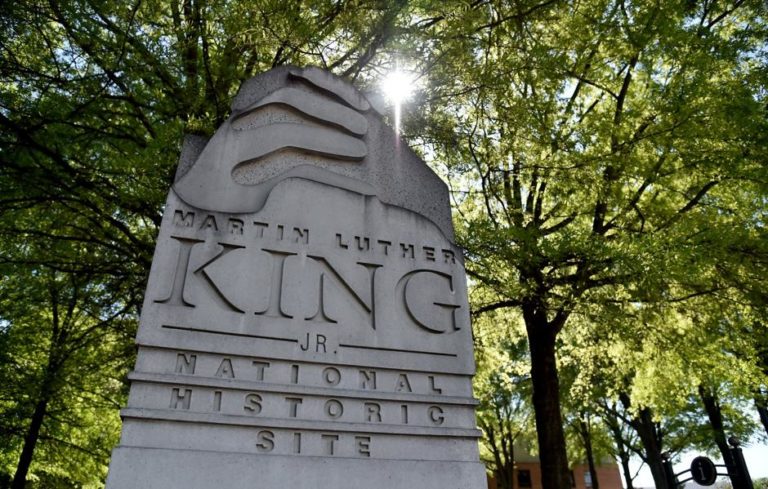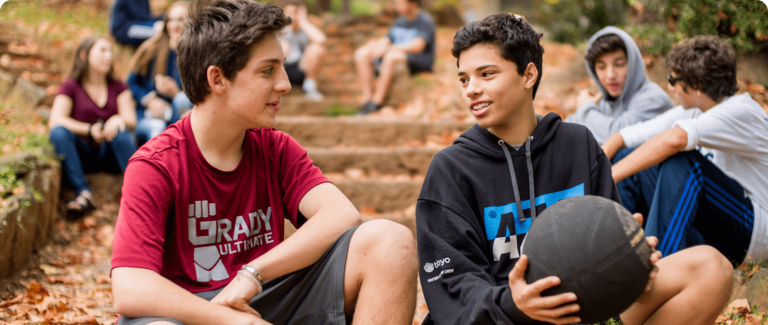
By Aaron Levi
First published at AaronLeviCurricula › and eJewish Philanthropy ›
I find myself at the intersection of Auburn Avenue and Jackson Street in Southeast Atlanta. Known as “Sweet Auburn,” this neighborhood was once the beating heart of Atlanta’s thriving African-American community and where Dr. King grew up. Nearly two dozen Jewish educators, professionals, and lay leaders huddle against the unseasonably frigid April weather in the MLK Jr. National Historical Park for Learning with Your Feet, an event organized by the Experiential Jewish Education Network and JumpSpark Professional.
In front stands Billy Planer, founder and director of Etgar 36, which offers social justice tours across the South that explore history, politics, and activism. Planer is a passionate Jewish educator who begins by challenging the standard narrative that “Jews were heavily involved in the Civil Rights movement” before adding, “Black-Jewish relations were not exactly as tight as we like to think.”
While many Northern Jews volunteered to register voters, participated in demonstrations, and marched in protests, “Jews,” he says, “stood on both sides of the [Edmund Pettus] bridge in Selma” in 1965. Southern Jews often stayed silent about Civil Rights for a variety of reasons, the most notable of which was, of course, the Leo Frank Case in 1913 and the Temple bombing in 1958. Frank’s hanging traumatized Jews in the New South, engendering a strong desire to blend in. The Temple bombing was specifically designed to discourage Atlanta’s Jews from engaging in the emerging Civil Rights movement.

Historic Ebenezer Baptist Church in Atlanta, GA
We walk across the street to the beautifully restored Ebenezer Baptist Church. The chapel strikes a perfect balance of intimacy and awe. Listening to Dr. King’s voice on a recorded sermon, I feel a deep connection to his legacy and mourn the absence of such a visionary leader whom we so desperately need today.
From there, our group travels via street car to downtown Atlanta to meet Julie Rhoad, The Names Project Foundation president and CEO. Rhoads cut her teeth as a stage manager in New York City during the early 1980s when the AIDS epidemic was considered a risk only for the “4 H’s”: Haitians, hemophiliacs, homosexuals, and heroin addicts.
“My friends were not considered human beings,” Rhoads recalls with watery eyes. “Their lives were disposable.”
For most of his presidency, President Ronald Reagan refused to act on, let alone acknowledge, this epidemic, so AIDS activists devised a way to “humanize the other and show that the AIDS epidemic was [and is] a human not a statistical tragedy,” says Rhoads. Enter the AIDS Memorial Quilt in 1987. Memorializing those lost in a quilt enshrines their legacies using the best traditions of American folk art.
The first quilt block I noticed prominently displays Hebrew letters commemorating the passing of Tamar Zinger, Amos Gutman, and Ittai. One of the 3-feet by 6-feet panels – roughly the size of a coffin – says in Hebrew: “To every person there is a name.” Written by the Hebrew poet Zelda, the poem whispers, “To every person there is a name/Derived from his celebrations/And his occupation. /To every person there is a name/Presented by the seasons/And his blindness.”
I strike up a conversation with Jennifer Rich, executive director of the historic Congregation Mickve Israel in Savannah, GA. As we discuss how today’s experiences apply to our work, Rich says, “Our community can help bridge the generations. We can bring Judaism to life by having difficult conversations about important issues. Judaism’s not only about what’s Kosher or non-Kosher or who reads the Torah. Jewish sources and our heritage of social justice are gifts we can use to help others. Synagogues can be a part of that, or [I fear] they’ll disappear.”
African Americans created a self-sustaining bubble in Sweet Auburn that uplifted and supported their community. And, yet, Atlanta’s progress thwarted what overt racism could not: In the 1950’s, Atlanta paved Interstates 75 and 85. By intentionally cleaving the business and cultural district from the neighborhood, the city’s officials created an economic vacuum that devastated the community. This painful history is integrally linked to Atlanta’s present as well as the entire nation’s future. As the city revitalizes, how we balance growth with inclusivity, accessibility, and equity will affect the city’s fabric and the Jewish community for decades to come.
A half-century has passed since the assassination of Dr. King, yet many of the social and economic issues for which he struggled still remain unresolved. Feel-good versions of history, the Civil Rights movement, and even what’s considered “progress” tend to blind us to the structural inequalities rending our society. Without seeing America as it is, we will never shape it into what it could be. Just as Rabbi Abraham Joshua Heschel once prayed with his feet to activate the nation’s conscience, today I learn with my feet as a reminder that Jewish education can contribute to a New New South by integrating and practicing the radical ideas expressed in the Torah, the Declaration of Independence, and the inspiring legacy of social justice activists.
–
Aaron Levi is a freelance curriculum developer and independent officiant of Jewish ceremonies. Aaron lives in Atlanta, GA with his wife and daughter and loves to read, write, play music, paint and cook.
The Experiential Jewish Education Network increases the impact and unlocks the potential of Jewish educators. It provides opportunities for learning, connection and collaboration that strengthen the skills and networks of its members and connects them to the best practices and ideas in the field. Find out more atwww.ejenetwork.org
The EJE Network is generously supported by the Jim Joseph Foundation and is a proud partner of Hebrew Union College – Jewish Institute of Religion, The Leadership Commons of the William Davidson School at the Jewish Theological Seminary and the Center for the Jewish Future at Yeshiva University.
JumpSpark Professional, a JumpSpark program, offers networking and professional development opportunities to Jewish education professionals in Atlanta. JumpSpark, part of the Jim Joseph Foundation’s Teen Funder Collaborative, is an initiative to raise Jewish teen engagement in Atlanta through experiential education and immersive, interest-based experiences.
 The Atlanta Jewish Teen Initiative, known as
The Atlanta Jewish Teen Initiative, known as  Tatum Gordon, who attends Mill Springs Academy, said, “Touring MBS was my favorite part, and learning the mechanics of how the roof works. We had a scavenger hunt at the College Football Hall of Fame, searching for characteristics of a hero. You don’t need to have superpowers to show compassion or be a hero.” Josh Silverman, who attends St. Francis High School said, “It was good to learn about entrepreneurs that were very successful and that dealt with hardships and still became successful. The entrepreneurs gave back to their community by setting up businesses in Israel.”
Tatum Gordon, who attends Mill Springs Academy, said, “Touring MBS was my favorite part, and learning the mechanics of how the roof works. We had a scavenger hunt at the College Football Hall of Fame, searching for characteristics of a hero. You don’t need to have superpowers to show compassion or be a hero.” Josh Silverman, who attends St. Francis High School said, “It was good to learn about entrepreneurs that were very successful and that dealt with hardships and still became successful. The entrepreneurs gave back to their community by setting up businesses in Israel.” 




 Our teens are looking for on-ramps for conversations with adults in a safe
Our teens are looking for on-ramps for conversations with adults in a safe

